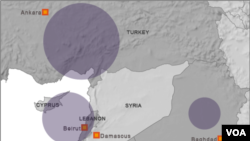BEIRUT —
Nearly one-half million Syrians have fled to Lebanon because of Syria's ongoing civil war. Many of these are families living in makeshift camps. But there is also a significant number of unaccompanied young men trying to survive in Lebanon's cities.
Near a construction site in central Beirut, Mahmoud, 20 -- he gives only his first name -- is selling bread from a bicycle cart.
He fled his home in Aleppo a year ago as the uprising against the Assad government became increasingly violent.
Most Syrian refugees stay near the border, often in makeshift housing. But some go to the cities to find work.
Mahmoud makes $15 to $20 a day. He misses home.
“A lot. I miss it a lot," he admitted. "As soon as this war is over I will go back."
In the evening, people exercise or relax on Beirut's seaside promenade, the Corniche.
Abderahman, 16, came with his older brother. He sells flowers to help his 13 brothers and sisters back home. He makes about $15 a day but it is hard work.
“As the day begins I sleep. I start working at three o'clock in the afternoon," he explained. "And I don't go back home until three o'clock in the morning.”
Ali Hassan, 18, came from Idlib with his brothers, aged 10 and 11. They live with some cousins. Their families feared for their lives as the conflict worsened.
“For sure the days are hard without my family. Without my mother. Without my father,” he admitted.
Hassan would like to return home. He hopes the conflict that has torn apart so many families will end soon.
Near a construction site in central Beirut, Mahmoud, 20 -- he gives only his first name -- is selling bread from a bicycle cart.
He fled his home in Aleppo a year ago as the uprising against the Assad government became increasingly violent.
Most Syrian refugees stay near the border, often in makeshift housing. But some go to the cities to find work.
Mahmoud makes $15 to $20 a day. He misses home.
“A lot. I miss it a lot," he admitted. "As soon as this war is over I will go back."
In the evening, people exercise or relax on Beirut's seaside promenade, the Corniche.
Abderahman, 16, came with his older brother. He sells flowers to help his 13 brothers and sisters back home. He makes about $15 a day but it is hard work.
“As the day begins I sleep. I start working at three o'clock in the afternoon," he explained. "And I don't go back home until three o'clock in the morning.”
Ali Hassan, 18, came from Idlib with his brothers, aged 10 and 11. They live with some cousins. Their families feared for their lives as the conflict worsened.
“For sure the days are hard without my family. Without my mother. Without my father,” he admitted.
Hassan would like to return home. He hopes the conflict that has torn apart so many families will end soon.






